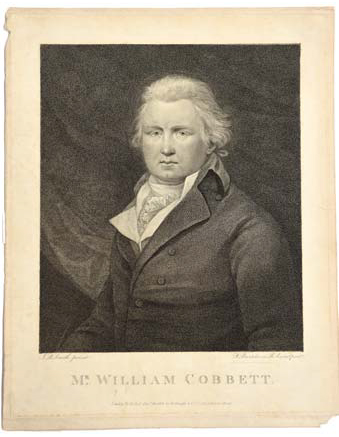William Cobbett was the most widely read British journalist of his era, though his name is not well known these days outside the UK. His fame lives on, uncredited, in a term that was invented to describe him.
Adelphi helps revive a fascinating local legend.

Engraved portrait of Mr. William Cobbett. 1801.
William Cobbett (1763–1835) was the most widely read British journalist of his era, though his name is not well known these days outside the United Kingdom. His fame, however, lives on, uncredited, in a term that was invented to describe him. Cobbett, the essayist William Hazlitt wrote in 1822, “is a kind of Fourth Estate” in politics.
Adelphi is working to bring renewed recognition to this illustrious figure through the crown jewel of its library’s special collections, The William Cobbett Collection. It is a collection that is designed not only to revive his name, but to point to the timeless relevance of his career.
“Cobbett was imprisoned for his writings and came to Long Island from London in 1817 to avoid having to go to jail for a second time,” said Elayne Gardstein, a senior adjunct professor and collections specialist who, along with her colleagues, oversees the 400-plus rare pamphlets, books and letters by and about Cobbett in the University’s possession. “His career demonstrates that freedom of the press has not always been an automatic right, even in England. It shows what we take for granted.”
Cobbett’s renown as a journalist and his troubles with the English authorities flowed from his poison pen. He was combative, abusive, bullying, vindictive and a master of ridicule. He was prickly and proud of it, often using the pseudonym Peter Porcupine.
But Cobbett was also principled. He never directed his invective toward the weak. Radicalized in prison, where he was beaten for defending fair pay for soldiers, he consistently called out the powerful, fighting against corruption in the British military, undemocratic rotten boroughs and unjust sedition laws.
Cobbett was also more than a political journalist and pamphleteer. He wrote a popular and influential Grammar of the English Language, works on gardening and agriculture, and Rural Rides, descriptions of the English countryside and issues facing the nation’s farmers.
Adelphi’s collection reflects all sides of Cobbett’s career and personality. The collection began almost 70 years ago, in 1948, at the suggestion of Owen Griffith Groves, assistant professor in Adelphi’s English Department. The first acquisition was The Life and Adventures of Peter Porcupine, dated 1796. More than 60 titles were added in the next decade— everything from Cobbett’s translation of the French Impeachment of Mr. Lafayette of 1793 to Advice to Young Men and (Incidentally) to Young Women in the Middle and Higher Ranks of Life from 1830.
The collection grew significantly in the late 1950s with the addition of about a hundred titles donated by Rutgers University English professor C. Rexford Davis and again after 1993 with the purchase of works by one of Cobbett’s radical contemporaries, William Hone.
This spring, Gardstein commemorated the bicentennial of Cobbett’s emigration to a farm three miles from Garden City by writing “Cobbett on Long Island.” Published in the scholarly journal Cobbett’s New Register, the article is a bibliography of the collection’s major works that she organizes by theme: emigration, farming, politics and grammar. It follows her 2016 article “Cobbett in America,” which served as an introduction to the collection’s history and contents.
In addition to research and writing about the collection, Gardstein is regularly involved in efforts to expand it.
“We are looking to add to the collection every year,” she said, “so I am always searching for items published during Cobbett’s time in America. I scan published bibliographies and bookseller catalogues to see what we don’t have, hoping to find other editions, other variants and other printings of works in our collection. We make a special effort to get things that are really rare.”
Almost all of the additions come through purchases from trusted rare-book sellers. Many come to the Antiquarian Book Fair in New York City every spring, often bringing works they know would be of interest to Adelphi. Booksellers also notify University Archives and Special Collections about rare titles, providing images and detailed descriptions.
All acquisitions are carefully considered. “We work within a budget, so we try to maximize the number of unique things we have,” Gardstein said.
She also spends a significant amount of time cataloging and editing finding aids that are vital to archival work. She works closely with the library’s cataloger, James Cho, assistant professor, to create expanded bibliographical records of all published works for the Adelphi’s online catalog. In addition, she and her colleagues create finding aids or inventories of unpublished items such as correspondence and ephemera; these are also put online in order to give researchers a complete account of the collection’s holdings.
Gardstein and her colleagues are also involved in efforts to scan items from the collection and make them available to scholars around the world. At the same time, she oversees the old-school method of preserving rare works, placing them in Mylar sleeves so researchers and students can read them.
In her more than 20 years at Adelphi, Gardstein has taken great joy in helping build the Cobbett Collection, which she sees as an important connection between the past and present. “It’s so exciting to find something rare,” she said. “The most fun is opening up a new purchase and seeing a bookplate of the person who owned it 100 years ago. Sometimes I even find notes that say things like ‘This was in my grandfather’s bookcase.’”
For further information, please contact:
Todd Wilson
Strategic Communications Director
p – 516.237.8634
e – twilson@adelphi.edu